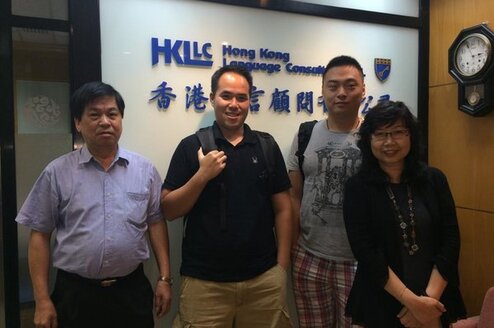Chinese Language Schools in Hong Kong
Chinese Language Programs in Hong Kong
About
For Chinese learners, Hong Kong is an interesting and unique choice from the typical Beijing/Taipei/Shanghai mix. Due to its long-standing history of being a British colony, Hong Kong’s culture is very much a mix of Western cultures and its own Chinese roots, thereby becoming more industrialized and more modern.
The official language of Hong Kong is both English and Chinese, Chinese being defined very vaguely. Most people in Hong Kong speak Cantonese, a Chinese regionalect, however immigrants from the mainland have increasingly entered into Hong Kong. Even so, learning Mandarin in Hong Kong isn't ideal. Few people speak it, so instead prepare to learn Cantonese in Hong Kong.
Come to Hong Kong to get a one-in-a-lifetime opportunity to experience a modern Asia. With so many cultural experiences, historical traditions, great food, and thorough teaching, it’s hard to say no to Hong Kong! Practice your Cantonese here, develop your Mandarin Chinese, talk with the natives; and immerse yourself in a culture that is only available in Hong Kong.
Course Types
Choosing Between Mandarin Chinese and Cantonese
As mentioned in the intro, Cantonese is by far easier to learn in Hong Kong than Mandarin since you'll be able to have a full immersion experience that way. Yes, Mandarin is more widely spoken otherwise, but elsewhere in mainland China.
You should not try learning both Mandarin and Cantonese at the same time. Learning Cantonese will give an edge if living in Hong Kong. But you still must understand that learning Cantonese is not easy even for a Mandarin speaker!
University courses
Taking classes at a university is popular and easy for university students because credits are transferred back to their respective home universities. Popular choices of universities for learning Chinese are the University of Hong Kong and Chinese University of Hong Kong.
These universities offer both courses in Mandarin Chinese and in Cantonese. An advantage of these types is not only will you be able to learn the language, but you can also learn a different perspective on a topic of interest. For those who are not students, this option tends to be harder to access, but it’s not impossible!
Private tutoring/group courses
Both of these are great options for those who are not able to attend universities. These can also take advantage of the small amount of people and encourage communication between students, which tends to be the best environment for language learning.
Also, if learning Cantonese, going out right after class and practicing outside is a great way to improve your speaking! Beware however; private tutoring tends to be double the price of group courses.
Language study & cultural immersion combination programs
Some programs offer this combination of language study and immersion, for they integrate culture as one of the big areas of interest, and then students are immediately able to experience this once class is over. Although typical programs will offer cultural events, they are not to the extent that these combination programs will offer! They speak of culture in every lesson, and will experience it much more than other programs.
Planning Your Trip
Around Hong Kong
There are two areas of Hong Kong: Hong Kong Island (which is generally more urban and more expensive than the other) and Kowloon Peninsula. Central District on Hong Kong Island is where Hong Kong all began, and grew into one of Asia’s pivotal financial and business centers.
Victoria Peak used to be one of Hong Kong’s most exclusive residences, as only the British could live there. Now, it is simply a fancy place to live, and is very famous for its mountaintop view of all Hong Kong; don’t miss it!
In the Kowloon Peninsula, Tsim Sha Tsui is a popular place for tourists and shopping, and some Hong Kong citizens avoid this place. If this isn’t your fancy, you'll see the more traditional side of the peninsual in Jordan and Yau Ma Tei.
Hong Kong is a center for culture outside of all the modernity. The region is still very attached to its Chinese roots, as traditional festivals such as the Dragon Boat Festival and Mid-Autumn Festival are highly celebrated. Hong Kong also has their own regional version of Chinese opera, called Cantonese opera, which is still very popular today.
Tips for learning Chinese in Hong Kong:
In a previous British colony, it’s easy to fall prey into speaking English rather than practicing your Chinese with the natives. Try as much as possible to speak Cantonese with them, as they know the language best!
Hong Kong happens to be one of the densest populated areas in the world! It packs every person and every building in a four hundred mile radius; thus it can be said that Hong Kong is a very vertical city. Sometimes it can be very hard to find things, or at least distinguish the good quality things from the not-so-much.
Look carefully, ask your friends about all the good restaurants nearby! A great resource that gives you a some insider tips in living in any region is Fodors, check it out for more information about living in Hong Kong.
Costs
Hong Kong tends to be a bit more expensive than on the mainland, and they also have different forms of currency. Since Hong Kong is mostly urbanized, expect prices to be about equivalent to those at your nearest big city.
Public transportation in Hong Kong is one of the most used in the whole world, and Hong Kong's Octopus card is accepted on railways, buses, and ferries. It's affordable; as the MTR (Mass Transit Railway) ranges from 45 cents to $1.30, depending on where you stop, Hong Kong Tramways’ adult fare is an affordable HK$2.30, or 30 cents a ride.
Food is generally a bit more expensive here than in the mainland, but nonetheless affordable (and delicious!) Get your Dim Sum ordering skills down quick, and eat your way through Hong Kong.













